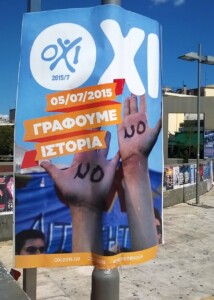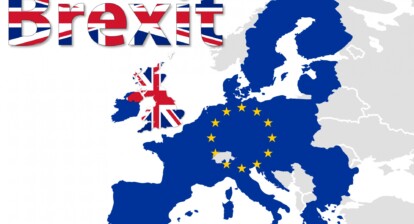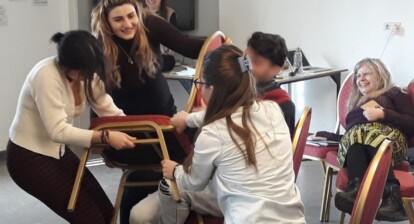What is the price of democracy and who has to pay it? Is the EU an economic union or a physiological unity? After the Greek referendum Milan from Serbia shares his considerations on democracy.
I grew up in a wasteland called Serbia. I’ve lived in rich and cultured France. And recently I’ve spent a month in a cliff-hanging Greece. I love Greece, and not in a cheesy sea, sun and olives way. I’m neither a journalist nor an analyst, but a plain historian who can’t help but hearing and seeing, connecting and comparing what is happening around him.
The Greek people voted on a strange and unexpected referendum on Sunday July, 5. The government decided to ask the people whether they agree with the conditions set by the ‘Troika’ (EC, ECB and IMF) in the course of the negotiations for the prolongation of financial aid – and the Greek people voted NO.
When the People get Their Voices Back…
To play the favorite Greek game of etymology, demopsefisma (referendum in Greek) literally means the vote of the people. When the people were called to vote about a week ago, we heard voices from the European Commission that we cannot expect the common people to understand such a complicated economic question. But then, how do we expect the people to understand the complicated political programs before the elections, the programs that include economic platforms?
I can’t help thinking of a statement of a then Turkish Prime Minister Recep Tayyip Erdogan during the Gezi park riots couple of years ago. He said that his people have given him a four year mandate on the elections, and that is why they had to obey his decisions during those four years. He proudly called it democracy.
If we fear that the people cannot understand something, shouldn’t we at least try to explain it to them? Then, how can we understand the attempt of the EC to hide the report of the IMF that assessed the platform proposed to Greece as unsustainable? Aren’t the freedom of information and the freedom of speech one of the basic democratic and European values?
Masters of Mistakes
I’ve been told that the only way out of the current economic crisis, especially in Greece, can be a new war in Europe. That would mean a repeating of the mistakes of the past, and doing the one thing the EU set out to prevent. But I’ve heard a Greek contemporary historian saying recently that he doesn’t believe we repeat the same mistakes – because we are so creative in making new ones.
I have noticed that inside the EU there is a kind of physiological, organic and functional unity. The union is not only an economic one. People who take part in it have grown together in ideas, goals and habits. It wouldn’t be strange for a Greek person to be closer in mind with a certain German citizen, than with some of his own compatriots. But on the political level, it is not rare to see European officials supporting national governments who go so far as violating basic human rights and liberties, only because they meet European economic interests. If you don’t believe me you should go live in the pro-European Serbia for a while.
Greece’s Struggle with Austerity and Social Issues
For example, the couple of past Greek governments, that made easy economic deals with their EU partners, where letting the extreme right Golden Dawn run wild and free and create a parallel militia throughout the country. Today, Golden Down sits in the Greek parliament, but a lot of its members sit behind the bars and in the court benches, too. The austerity measures led to an estimate of at least 50.000 homeless people in Athens. Today, a number of government and civil programs try to give them basic aid.
We should remember that the “pro-European” politicians that urged the Greeks to say YES on this referendum organised the operation Xenios Zeus two years ago. During this operation a great number of illegal immigrants, drug users and transsexual people were held in the camp-like prisons on the arbitrary accusations. The program was officially canceled in January. The number of policemen on the streets of the capital was substantially reduced this year. People told me they felt much safer now. I walked through the “dangerous” parts of Athens, I walked with the participants of the Pride Parade last month, and I felt the same.
Greece’s Democratic Message to Europe
So, it seems that the extreme poverty and insecurity are not leading the Greeks towards the “same mistake” of generating nationalist or other extremist fury that could lead into conflict. On the contrary, the government is trying to create a strange welfare state in the impossible circumstances. That is the government that the Greek majority gave the mandate to six months ago, and then confirmed it this weekend. That’s why the Greek NO is a YES to a more democratic and socially responsible Europe.
NO to Austerity, YES to Democracy
The famous British Prime Minister Winston Churchill is often quoted on his attitude towards democracy. He said it was the worst form of government, except for all the others that had been tried. That attitude can also be very easily transferred to the concept of the European Union. Not an ideal system, not an utopia, but the best we had so far.
“This is democracy,” – said Merkel and Hollande after their post-referendum dinner. They called for the balance between solidarity and responsibility. I somehow think the Greeks had the same idea on their mind when they voted NO. The fact that they find it hard to reach a compromise tells us that the EU needs to change. Now it has an opportunity.







